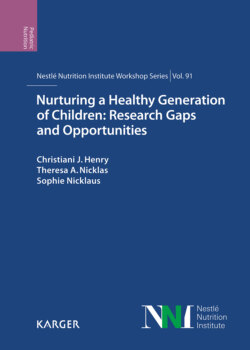Читать книгу Nurturing a Healthy Generation of Children: Research Gaps and Opportunities - Группа авторов - Страница 25
На сайте Литреса книга снята с продажи.
Abstract
ОглавлениеChildren’s vegetable consumption falls below current recommendations, highlighting the need to identify strategies that can successfully promote better acceptance of vegetables. Recently, we described two promising approaches to increase the acceptance of vegetables: (a) offering infants a variety of vegetables (purée changed every day for 10 days vs. 3 days and no change) at the beginning of weaning increases acceptance of new foods, including vegetables, and (b) offering 7-month-old infants an initially disliked vegetable at 8 subsequent meals markedly increases acceptance for that vegetable. The first stage of the study showed that these different effects persisted for several weeks. In a follow-up study, at 6 years, observations in an experimental setting showed that children who had been breastfed and who had experienced high vegetable variety at the start of weaning ate more new vegetables and liked them more. They were also more willing to taste vegetables than formula-fed children or the no- or low-variety groups. The initially disliked vegetable was still liked by 57% of children. This brief review shows that experience with sensory variety in the context of breastfeeding, early experiences with vegetable variety during complementary feeding, and repeated experience with an initially disliked vegetable can influence food preferences and healthy eating habits into childhood.
© 2019 Nestlé Nutrition Institute, Switzerland/S. Karger AG, Basel
